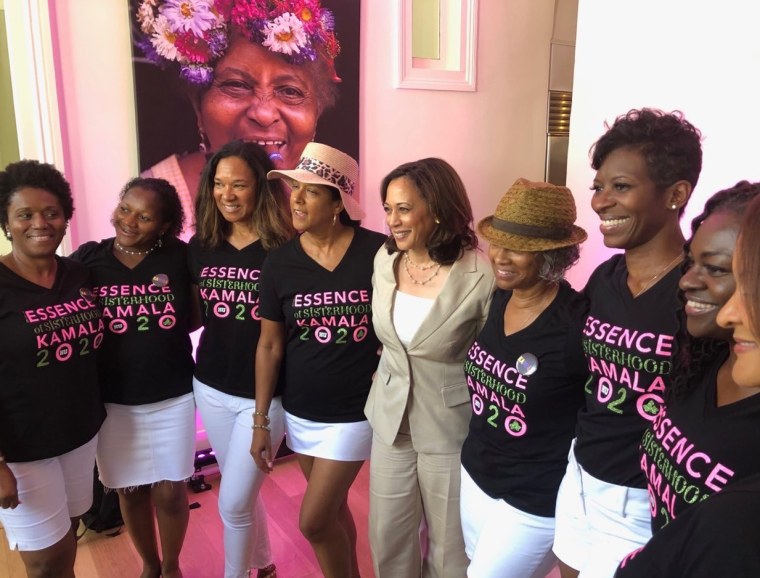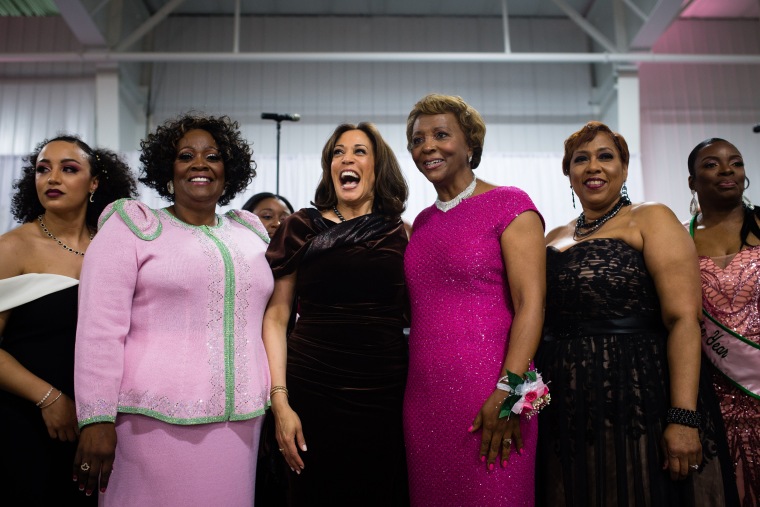Dawn Beatrice Griffin was excited the evening she put a sign in the front yard of her Atlanta home that said: “Kamala Harris Is My Sorority Sister.” When she opened her blinds the next morning, there were little Black girls in her yard taking pictures.
Griffin realized those girls saw possibilities she had not imagined when she was their age.
“Some of those kids have seen a Black president — and now they see Kamala,” said Griffin, a scientist, referring to Harris, the daughter of Jamaican and Indian immigrants who is the first Black American to run for vice president on a major party ticket.
“Those little girls will not see limitations,” Griffin said. “As a young girl, I don’t think I was ever told I could be president — or vice president.”
Harris has a lot of “firsts” attached to her name: Aside from her historic campaign with Joe Biden, she is also the first graduate of a historically Black college or university (HBCU) and first member of a Black sorority to be nominated to a major party’s ticket for the White House. Griffin, like Harris, is a member of the oldest Black Greek letter sorority, Alpha Kappa Alpha (AKA), founded in 1908 at Howard University.
But the organization is a member of an even larger “family” of Black sororities and fraternities known as the Divine Nine, whose nearly 2 million members are community leaders, civic activists and philanthropists adept at raising money.
Griffin watched Biden announce his running mate on television in August.
“I squealed. But then I started texting to raise money,” she said. “Then I immediately made hotel reservations to be in Washington for the inauguration.”
Though sororities and fraternities are apolitical organizations that do not endorse candidates, members are expected to follow missions that include being active in civic and community efforts. Harris, a U.S. senator and former California attorney general, who pledged AKA in 1986 at Howard, may depend on the personal support of the “sisters” of her sorority, which has some 300,000 members. But she will probably also garner the energy and financial power of most of the members of the nine historically Black Greek letter sororities and fraternities.
“There’s excitement among all the Greeks,” said Laura Brown Morse, an Atlanta psychotherapist and member of Delta Sigma Theta. “Her addition to the Democratic ticket made people get excited about a VP pick when sometimes that position just seems more like an unnoticed formality. Mobilization efforts started immediately.”
“We are all sisters, we just wear different colors,” said Mae Frances Frazier, chaplain of the D.C. National Pan-Hellenic Council — which has members for each of the Greek letter fraternities and sororities — and a member of Sigma Gamma Rho. “The brothers in our fraternities are saying the same thing.”
The Divine Nine organizations are used to launching major campaigns, setting financial goals — and meeting them. For instance, under AKA President Glenda Baskin Glover — who is also the president of Tennessee State University — the sorority set a goal of raising $10 million in four years to provide badly needed financial support for HBCUs.
Black women are one of the most reliable Democratic voting blocs. Without Black women President Barack Obama would not have been re-elected in 2012, when they delivered key battleground states, according to a 2017 AFL-CIO report on Black female voters.These women are expected to play a vital role again in the 2020 presidential race, and the network of Black sororities and fraternities can play a significant role in persuading that voting block to turn out again.
Harris often shows up in public wearing her ivy leaf AKA pin, seats her sorors at the front of her events and maintains her friendships with her line sisters from her days at Howard. Black Greek organizations differ from predominantly white fraternities and sororities in that members are encouraged to remain active for life and collectively involved in social activism.
Gayle Danley, an artist and poet in Bethesda, Maryland, was one of the 38 women on the AKA initiation line with Harris at Howard University.
Danley said Harris keeps in touch with her line sisters, calling when they are sick or need encouragement.
“As her inner circle, I see my line sisters’ roles are … to keep her encouraged, strong and nurtured. It’s going to be a fight,” Danley said.
The sorors will “rally around Kamala much like we did when on line,” said Lorri L. Saddler Rice, associate vice president and dean of undergraduate admission at Clark Atlanta University. “Whatever challenge was put before us as initiates we worked together to accomplish the task. We’re leveraging the same gifts we had in 1986 to support her.”
Last year when Harris announced she was running for president, her sorority sisters from Howard University held an event for her in Washington that netted more than $100,000.

“We took that model and duplicated it in the local market,” said Saddler, who hosted an event in Atlanta that raised more than $70,000.
Michelle Arrington, an Atlanta attorney and AKA soror, is excited about seeing “someone like me” on the Democratic ticket. Arrington, 43, who also graduated from Howard, noted Harris’s recent introduction of legislation to support uterine fibroid research and education.
“I had to get fibroids removed, so this was personal for me,” said Arrington.
Announcing the bill, Harris said in statement, “Black women develop uterine fibroids earlier, have larger and a greater number of fibroids and are three times more likely than white women to be hospitalized” for them.
Meanwhile, Harris’s public acknowledgement of her sorority and the Divine Nine may also offer a history lesson to millions of Americans.
AKA member Thyrsa M. Gravely said, “I’m finding a lot of people — particularly white people — are just learning about the Divine Nine.”
Gravely recalled working at a Boston consulting firm right after college in the 1990s when a co-worker asked her about seeing men in what Gravely recognized was fraternity gear.
“He asked: ‘What are they? Are these gangs? When I see them on one side of the street, I cross over because I’m afraid,’” she recalled him saying.
“It’s a brotherhood, a fraternity and you don’t have to be careful of them,’’ Gravely responded.
Valerie Robinson, a member of Zeta Phi Beta Sorority who serves as chaplain on the National Pan-Hellenic Council Executive Board, had a similar experience recently.
“My neighbor two doors down she saw me with my sorority stuff on the other day. She’s seen me in it for years. But now she said, ‘Are you a part of that organization that Kamala Harris is a part of?’ I said, ‘Yes.’”
Robinson emailed the neighbor a YouTube documentary on the Divine Nine.
“When I saw her, she said, ‘You all have been around a long time.’ And she told me she shared the video with other people.”

